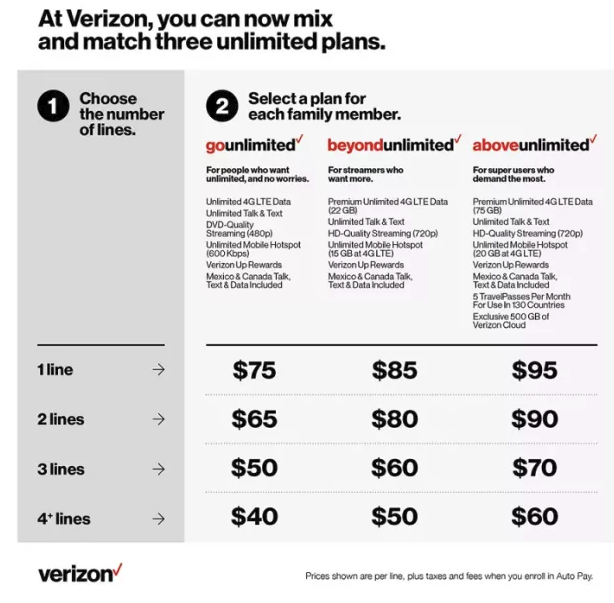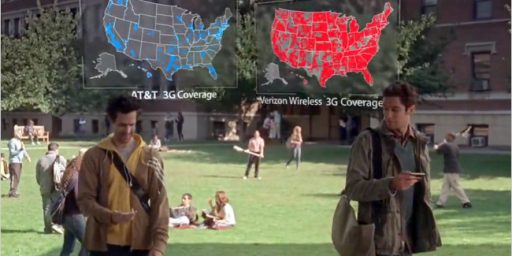Verizon Has Three Levels of ‘Unlimited’ Plans, Each with Limits
Words mean things. Unless they don't.
Sam Rutherford argues that “Verizon’s New Phone Plan Proves It Has No Idea What ‘Unlimited’ Actually Means.”
Wireless carriers have already demonstrated an inability to understand what “unlimited” actually means, offering phone plans that habitually throttle customers who use more than 26GB or so of data every month. However, with the release of its new Above Unlimited plan, Verizon is pushing the mental gymnastics carriers employ to define unlimited to a whole new level.
In addition to its Go Unlimited and Beyond Unlimited plans, Verizon is now adding a premium Above Unlimited plan to the mix, which offers 75GB of “unlimited” data per month (as opposed to the 22GB of “unlimited” data you get on less expensive plans), along with 20GB of “unlimited” data when using your phone as a hotspot, 500GB of Verizon cloud storage, and five monthly international Travel Passes, which are daily vouchers that let you use your phone’s wireless service abroad the same as if you were in the U.S.
And as if that wasn’t bad enough, Verizon has also updated its convoluted sliding pricing scheme that adjusts based on how many phones are on a single bill. For families with four lines of service, the Above Unlimited cost $60 per person, but if you’re a single user the same service costs $95, which really seems like bullshit because if everything is supposed to be unlimited, it shouldn’t really make a difference how many people are on the same bill.
While Rutherford is fundamentally correct on his main point—“unlimited” has an unambiguous meaning and none of these plans match it—I’m not sure I have a real problem with any of this.
I’m a Verizon customer on an older “Unlimited” plan, from when “Unlimited” was their top tier, priced at $65 (plus lots of taxes and bullshit fees that bring the bill to way more than that, but that’s standard in the industry). It says right on my account that “After 22 GB used, speeds may be reduced in heavy network traffic.” But, since I seldom use more than 10 GB a month, that’s not much of a concern.
While I would use a lot more data if I didn’t also have a separate home broadband connection, allowing me to do most of my streaming and whatnot via WiFi vice my data plan, I’m still on the high side for American customers. The average is something like 2.76 GB a month.
Aside from the fact that the potential for throttling is transparent, I give the company slack for describing an amount of usage that’s far and away more than most customers will use as “Unlimited.” If I go to an “all you can eat” buffet, I expect to be able to eat a lot of food. But I wouldn’t blame a restaurant manager for telling a customer who stayed several hours and continued to graze that he was abusing the policy. Or, in perhaps a closer analogy, if a company offers “unlimited cloud storage” for photos, I’m not going to be upset with them if by “unlimited” they mean “up to 50 terabytes,” a limit that would impact only professional photographers.
And Verizon isn’t even doing that. It’s simply saying that, at an extremely high rate of usage, it reserves the right to slow the rate of data transfer during peak hours. Presuming that the throttling isn’t so slow as to effectively be a non-availability of data, that’s not particularly onerous. And, for that matter, another $10 a month isn’t exactly a huge penalty for power users.
For that matter, the base plan is also “limited” in terms of the quality of digital streaming (DVD vs HD) and outside-North America access. And, heck, even the advanced plans are probably limited to places in reach of a cell tower. But customers wouldn’t have a legitimate complaint that their “unlimited” data plan didn’t work while scuba diving or serving aboard the International Space Station.
And this complaint seems especially silly:
For families with four lines of service, the Above Unlimited cost $60 per person, but if you’re a single user the same service costs $95, which really seems like bullshit because if everything is supposed to be unlimited, it shouldn’t really make a difference how many people are on the same bill.
Returning to the buffet analogy, $10.99 all-you-can eat pizza does not entitle you to bring your family with you. Or to bring take-out boxes.







My ATT “unlimited” plan is $45/mo. Much cheaper than those Verizon ones.
This is what the end of net neutrality looks like.
@James Pearce:
These policies were in place long before net neutrality was repealed.
@Doug Mataconis:
I’m not sure why the downvotes; this is indisputably true. Indeed, while Americans pay high rates by global standards—data is far cheaper and transfer faster in most OECD countries—prices for data have been dropping precipitously as our usage has increased.
@James Pearce:
This has nothing to do with network neutrality; Verizon isn’t throttling or not throttling based on the source of the data.
@Doug Mataconis:
Indeed. ISPs wanting to throttle you are why we needed net neutrality in the first place.
@James Joyner:
Because by “This is what the end of net neutrality looks like”, James Pearce actually meant “vote democrat”.
Soon some of this “unlimited” plans will be advertised as “literally unlimited.”
Sorry, but unlimited means unlimited, and placing limits on something you advertise as “unlimited” should be considered fraud.
As to buffets, the Bacchanal Buffet in Caesars Las Vegas has a time limit, but I forget how long. It’s not enforced, but it’s known.
And all buffets are subject to operating hours. You don’t expect to be able to eat at a buffet before it opens or after it closes.
@Stormy Dragon:
Ha! That would be very out of character for me…
Let me be a little more clear, then:
The end of net neutrality means charging you an extra $20 a month for getting the “AboveUnlimited” plan, which is not unlimited, and is only better than the “GoUnlimited” plan in very small, annoying ways.
As a former Verizon Employee… I’m now on Sprint (due to lower costs).
My wife had the AT&T grandfathered unlimited iPhone plan from the iPhone 1 days… however the limit was only 200 texts per month.
Now we are on the Sprint 55+ plan (two lines, unlimited $70.00), which is less than either of our one lines.
However, the mindblowing deal is $15.00 unlimited, and that ends TODAY: https://www.sprint.com/en/shop/plans/unlimited-kickstart.html
@James Pearce:
Network neutrality only specifies that all content providers must be treated equally, and has nothing to do with data caps or billing rates. If Verizon started throttling Netflix at the datacap, but let FIOS Flex View continue to go full speed, then THAT would be a network neutrality violation because Verizon is giving its in house service preferential treatment. If everything is getting throttled the same, then Network Neutrality isn’t involved.
You clearly have no idea what “network neutrality” means, other than your team is for it and it has something to do with throttling because that word comes up a lot when network neutrality is discussed. So as soon as you saw the word “throttle” in Dr. Joyner’s article, you went “AWK! Network Neutrality!” like a well trained parrot and then got pissed at Doug for not giving you a cracker.
@Liberal Capitalist:
Video streams up to 480p. Music up to 500kbps. Gaming streams up to 2mbps. Data deprioritization during congestion.
I wouldn’t call that unlimited.
But it is cheap.
@PJ:
Sure, if I was in my early 20’s and living on my phone, I may not want to do that.
However, I use my for calls, texts, email (via free outlook / yahoo), and the video that I stream is just to see a quick “how do I do that” video on youtube… If I want to watch something, it will be on the 65″ LG OLED,.
So, yes, it is a screaming deal for the olds.
@Stormy Dragon:
Only? Oh, there’s a little more to it than that, but okay…
I don’t downvote comments normally — I reply to them– so I have no idea who downvoted Doug’s comment. Maybe it was wr?
FWIW, I understand why people would be skeptical of network neutrality policies. I just wish the critics would do a little more thinking about why people support them. I don’t know about you, but I don’t have an extra $240 a year to spend on phone company greed.
@James Pearce:
Net Neutrality would not have prevented this because it had nothing to do with ISP policies about throttling upload/download speeds for users. Net neutrality only dealt with the relationship between ISP’s and content providers.
It’s like this: my broadband connection at home, through the phone line, is “unlimited” and has no data or time caps. I can also connect as many devices as I want at any time I want, and the only limit is how fast the modem can apportion data to each. Years ago I had broadband through a cable company, and the deal was the same.
That’s unlimited.
If an “unlimited” plan with caps were a buffet, then your food would be weighed after each serving, and past a certain limit you’d be charged extra.
@Doug Mataconis:
I can see how Net Neutrality, if accepted as a principle, which it is, would prevent these money grabs by de-emphasizing the importance of bandwidth and recognizing that the valuable thing is the content itself.
Who is Verizon to tell me that 75GB is “super user” level stuff?
@Kathy:
I’ll disagree. “Unlimited” means nothing more than “you pay us this fixed monthly amount in return for whatever unlimited amount of data you wish to transfer during the period you’ve paid for”.
That’s it. It doesn’t include “at whatever speed you think is appropriate”.
@James Pearce:
You mean besides the owner of the network you’re using?
@HarvardLaw92:
I’ll disagree, too, but on the basis that “all you can eat” is, in fact, a limit, and so a buffet is a poor metaphor for an “unlimited” cell phone plan, which is not “unlimited” by any means and is most definitely not an “all you can use” type of situation.
As to the “owners” of the network, interoperability requirements means that the network isn’t even completely theirs. It’s part of a larger system that can’t operate independently. Verizon owns the nodes to hop onto the network, but thank God they don’t own the only ones.
Verizon is able to get away with this because people are thinking about how they used their phones two years ago. “Well, you don’t need that much data to download MP3s and watch my Youtube videos, and at least I’m not paying for ‘minutes’ anymore.” They should think about how they’re going to use their devices two year from now, with lossless audio formats and 4K video and other data-intensive application, some not even thought of yet.
Verizon is certainly thinking about it and they think you’ll be upgrading your plan.
@James Pearce:
Sure it can. CDMA vs GSM, anyone?
The bottom line is that Verizon owns their data network, and can essentially charge whatever it likes, under whatever terms it wants to impose, for access to that data network. Note that we’re talking about data, not telecommunications (which the law holds to be voice communications). Data is a nice, cool thing you happen to get on a device which is primarily a voice communications terminal (even if most people don’t utilize them as such).
In that regard, they’re upholding the bargain they sold – you pay a fixed fee and you get to download as much data as you like without having to pay additional charges for that data. That doesn’t imply that you’ll always receive maximum speed, and in fact the agreement you enter into with them explicitly states that you may be throttled beyond certain limits.
That having been said, cellular data is in fact unlimited. It’s not like a self limiting buffet. You can set your phone up to stream video that never ends, and it will keep streaming that video until you stop it from doing so. Unlimited means that charges are not predicated on quantity, and technically speaking they’re delivering that. If you limit your own use through your inability to drive your phone 24 hours a day, that’s a limitation YOU are imposing onto the situation, not one imposed by Verizon.
I get that people want to view cellular data as being a public utility. Their problem is that it isn’t one. Voice comms are.
@James Pearce: “Maybe it was wr?”
Don’t blame me. After all, I’m a white male, so you know I can’t do any wrong ever.
@HarvardLaw92: “I get that people want to view cellular data as being a public utility. Their problem is that it isn’t one. Voice comms are.”
And yet, a vote in congress or a decision by the FCC could change that. It’s not some immutable law sent down from God — it’s a political decision made by people who have been heavily lobbied by a cash-rich industry.
@HarvardLaw92:
Well, sure, companies can decide whether they want to suck or not, whether they’re going to serve their customers or rip them off. That’s not in dispute. If Verizon wants to be one of those companies that has to run “we’ll do better” commercials ala Facebook and Wells Fargo that’s their choice.
Probably not a good choice, but hey…they can always consolidate again. I was pretty young when Ma Bell was split up, but from what I hear, the old days were “great.”
My Galaxy S8 is not primarily a voice communications terminal, though, and the next generation of devices won’t be either, not to mention the fact that a lot of “voice communications” these days are transmitted as data. Most of my phone calls are made over wifi. The company I work for, all our phones are VOIP. We used to have POTS backup lines, but for what?
Voice is data.
Well, if it’s not yet, it will be, especially if these phone companies continue to act like this.
@wr:
Oh, buddy, you can definitely do wrong. It’s just that when you do wrong, me and all the other white men don’t share the blame. That’s the difference between justice and “social justice.”
I never cease to be amazed at people who seem to think “what I want” equates to “what I am entitled to”.
If you don’t like their service, find another cell provider. There’s certainly not a shortage of them.
That having been said – have any of you clutching your pearls about this “injustice” actually been throttled? 🙄
@HarvardLaw92:
Well, to a paying customer, “what I want” is “what I am entitled to,” so maybe don’t look at this as some “taker” trying to get free stuff from the “maker” and look at it as what it is: a business transaction in which services are exchanged for money and the boss is me, the guy with the money.
Done. Just don’t say this too loudly when the investors are around, as they’ll probably see service improvements and customer satisfaction as the surer path to long-term profitability than carrier switching.
Yes. It’s an annoyance I’m almost willing to pay not to suffer, but I won’t. Not only do I feel like I’m paying enough already, I feel like I don’t need to pay extra not to be throttled. It’s not exactly a protection racket, but it’s pretty damn close.
@James Pearce:
LOL, no, what you are entitled to is what is specified by the agreement you entered into when you established the service. If you don’t like the agreement you can, as I said earlier, cancel it, haul your backside to another vendor which offers something more to your liking, and set up shop there.
If enough of you do it, they’ll be motivated to change their policies – or they’ll decide that the impact to their network and the costs involved in delivering what you want aren’t justifiable, and they’ll say “no thanks”.
But all of this “why, they must be regulated by law so that I can get what I want for what I’m willing to pay for it” bullshit? No thanks. They’ll probably tell you the same.
@HarvardLaw92:
Ha! The “agreement.” You know we’re talking about a phone company, right?
I didn’t say that, did I? I said, “This is what the end of net neutrality looks like.” As in “confusing and shady pricing tiers,” as in “throttling customers to generate revenue,” as in “stifling innovation because of rent-seeking greed.”
You thought I was calling for more regulation from the gubmint? Nah, the cell phone business is cut throat right now. Most of the carriers will figure it out, probably by branching out of the cell phone business into something more vertically integrated that will find its revenues not by throttling bandwidth but by unleashing it. “Verizon” may not even be part of that world. Their big idea lately has been to buy AOL and Yahoo! Not sure what they’re gonna do with that shit…but good luck to them and their “unlimited” plans.
(And just think…if this nonsense tanks, and these practices become verboten in the industry, we won’t need to worry about net neutrality ever again.)